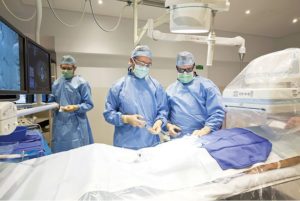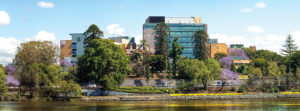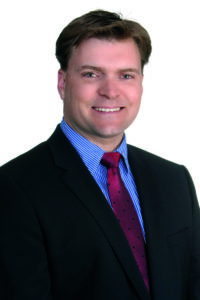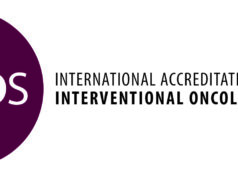
Ten centres have achieved the International Accreditation System for Interventional Oncology Services (IASIOS) accreditation, a benchmark of quality standard and assurance, since 2018. Wesley Medical Imaging has just achieved this recognition to become the first hospital in the Southern Hemisphere to do so. Interventional News speaks to Nicholas Brown (clinical director at I-MED, The Wesley Hospital, Queensland, Australia) on this significant achievement and how it certifies that this hospital is providing the highest standards of interventional oncology (IO) care. “Personally, I am convinced it will bring game-changing renewal and evolution to interventional radiology practice around the world,” he says.
Commenting on the main benefits he foresees as a result of being granted this recognition, Brown says: “The IASIOS accreditation will allow our centre to promote our high standards to patients, referrers and hospital administrators. The process of seeking IASIOS accreditation allowed us to review and critically appraise our existing practices, and to ensure that how we work is aligned with the international standard. The promise of accreditation provided us with the motivation to examine every facet of our practice, including areas where we needed to improve our practices to comply with the IASIOS requirements.”
Brown is categorical about what prompted Wesley Medical Imaging to undergo the rigorous IASIOS accreditation process. “The IO service offered at the Wesley Hospital has always been comprehensive and progressive, and the IASIOS accreditation now provides us with an opportunity to ensure that our practices are benchmarked against an international quality standard. IASIOS accreditation provides us with the confidence that we are providing the highest standard of care, and will allow us to adopt new and evolving technologies within a quality framework. Furthermore, it will provide confidence to patients and referrers that our centre can be trusted to deliver the best possible care.”

The IASIOS award, in addition to being the bright line that separates centres that deliver top quality IO care, has wider implications for the growth and development of IO in Australia and New Zealand. Brown elaborates: “Quality assurance and quality control in interventional radiology and IO is critical. ‘Quality’ is the yardstick by which specialty practice is measured and judged by our clinical colleagues, and demonstrates a mature, professional approach to clinical care. The IASIOS system in Australia will help to ensure that quality standards remain a guiding focus as interventional radiology and IO evolve. It particularly demonstrates that specialist IRs can fulfil their potential as equals within the multidisciplinary team environment. Quality assurance is the mark of a true clinical speciality, and an accreditation programme that seeks to uphold standards of practice is a tremendous boost towards promoting these in interventional radiology. IASIOS is an effective tool that legitimises the high standards that we all strive for day-to-day, and provides an easy riposte to any out-dated attitudes from colleagues who doubt the notion of IRs being true clinicians. If ever we needed proof that IRs are clinicians and not just technicians, IASIOS provides it in abundance.”
A challenging process, huge achievement and the team’s unforgettable reaction
The IASIOS process is challenging, as is appropriate for a system designed to set and maintain high quality standards (see box). “It provided a thorough analysis of work practice and required an in-depth review of every part of what we do and how we interact with patients, referrers and the broader hospital setting. The process also takes longer than anticipated. Not all the information required for a successful application will necessarily be readily available, and may have to be reviewed, reproduced or re-written. A critical component—the case audit—is an opportunity to demonstrate the depth of specialty practice but it requires time to compile all the necessary aspects.
The IASIOS process definitely requires a team effort, but also needs one or two local champions who can take responsibility for the process and spearhead progress towards a completed application. A leadership team that involves clinical, nursing and administrative insights is very important.

An 18-month process, involving hard work and contributions from clinical, nursing, technical, administrative and managerial staff culminated in a successful accreditation. The whole team was absolutely thrilled and rightly proud of this achievement and the recognition that it brings. The affirmation of our high standards of practice is both reassuring and motivates us to continue to improve and evolve. We are also very pleased to be able to share this exciting news with our patients and referrers, as we look to grow not only our practice, but represent the capabilities of the broader interventional radiology profession,” says Brown.
Specifically addressing other global centres who might wish to undertake the accreditation process, Brown says: “It is good to remember that persistence will pay off, eventually. The Accreditation Certificate is just reward for a great effort and lots of difficult work. Attaining and promoting high quality standards in clinical care are important ways of supporting your practice and your profession.
“We are extremely grateful to CIRSE for embarking on the IASIOS journey, and personally I am convinced it will bring game-changing renewal and evolution to IR practice around the world. We are also thankful for the confidence (and patience!) shown to us by CIRSE in having the Wesley Hospital as a pilot site and encouraging us to complete the accreditation programme.”
|
What is the process of IASIOS accreditation? The accreditation process begins once a facility has registered. By initiating the process, they receive the first seal—that of an IASIOS Enrolled Centre. With the first step, they have shown that they are dedicated to increasing the quality of the patient pathway in their IO service line. The goal of IASIOS is not to make a judgement on the quality of the department at the time of registration, rather it is to help the centre make the necessary adjustments and changes to bring their service to the level outlined in the core requirements of the Standards of Quality Assurance document. The centre can remain an Enrolled Centre for as long as necessary to make the changes and they can utilise the full support of the IASIOS team along the way. Each application is independently reviewed by two assessors who must both come to the same agreement that compliance has been demonstrated before the seal of IASIOS Accredited Centre has been granted. If there is any doubt on the answers given in the application form, the facility will be able to provide additional documentation or the assessors may request a remote audit for a detailed discussion. After a centre has been an IASIOS Accredited Centre for four years, they have the option of becoming re-certified, or they can ambitiously aim to demonstrate compliance to every single standard outlined in the Standards of Quality Assurance document, which would grant them the IASIOS Centre of Excellence seal. How does CIRSE guide centres across the globe through the process? The IASIOS team is readily available for any questions that may arise or obstacles that may be encountered during the application process, whether by email or video call. We have manuals and guidelines that have been developed, and are constantly gathering feedback and information that we can collect and make available to the centres going through the accreditation process so they can learn from the centres that have gone through the process before them. We have been developing a system that is completely online and digitised so it can be easily accessed by multiple people and multiple assessors regardless of time zone or location in the world. Our goal is to create a truly global community of people dedicated to advancing interventional oncology, learning from each other and increasing its quality of care and recognition. As the community grows further, we will be able to offer enrolled centres guidance from council members and consultants in all areas of the world. We received an overwhelmingly positive response from dedicated IO experts worldwide supporting this initiative and joining the IASIOS community as Council Members. How many centres have achieved accreditation since the 2018 pilot phase? From the 12 centres that participated in the pilot phase, 10 centres have achieved accreditation and two are undergoing accreditation. These include hospitals from Europe, Asia and the Southern Hemisphere, more specifically: The UK, France, Germany, Switzerland, Italy, the Netherlands, Turkey, Singapore and most recently – Australia. Since the launch of the scheme in April 2021, eight centres have initiated their enrolment and are awaiting administrative approval from their hospitals. These include hospitals from Canada, Switzerland, Italy, Germany, Austria, Sweden, the UK and the Netherlands. |

 The Cardiovascular and Interventional Radiological Society of Europe (CIRSE) signposts the IASIOS process:
The Cardiovascular and Interventional Radiological Society of Europe (CIRSE) signposts the IASIOS process:











